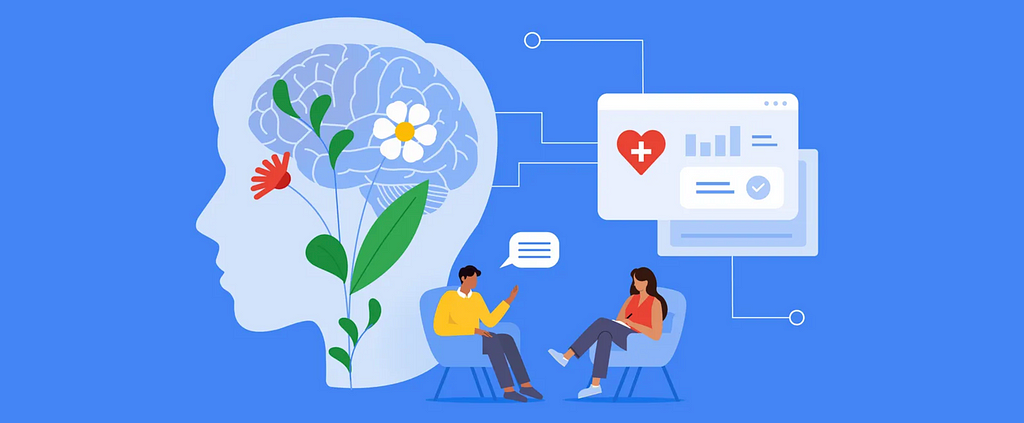Artificial Intelligence (AI) is revolutionizing various industries, and mental health is no exception. Recently, I conducted a research project to explore the potential applications of AI in mental health. This involved interviewing 10 individuals from diverse backgrounds, residing in California, who have regular experience with therapy. My goal? To understand how AI could enhance therapy while maintaining the essential human touch.

The interviews had two parts:
- Getting to know the participants: General questions to understand their therapy experiences.
- Exploring AI’s potential in mental health: Asking for feedback on AI features that could support daily progress tracking and assist therapists in sessions by analyzing conversations, suggesting diagnoses, and offering treatment plans — all while ensuring therapists remain in full control of these suggestions.
Here’s what I discovered.
1. AI as a Complement, Not a Replacement
One of the most significant findings was that patients are open to using AI as a supportive tool, but not as a substitute for human therapists. Many appreciated features like daily support, session analysis, and treatment recommendations. However, they stressed that these tools should empower therapists, not replace the human connection critical to therapy.
2. Accessibility and Efficiency
Participants recognized AI’s potential to improve the accessibility and efficiency of mental health care. Features like 24/7 support, streamlined scheduling, and reduced session prep time were seen as valuable, especially for those in remote areas or facing long wait times. They believed AI could address gaps in therapist availability and even support cultural and language-specific needs.
3. Privacy Matters
Concerns about privacy and data security were universal. Participants wanted assurance that their personal data would be safeguarded against breaches and used ethically.
4. Preserving the Human Element
Another common theme was a concern about therapists becoming overly reliant on AI. Patients worried that therapists might miss subtle emotional cues or take on more patients than they could handle, leading to compromised care. They emphasized that AI should enhance — not replace — the therapist’s expertise.
5. Addressing Language and Cultural Barriers
Language and cultural barriers significantly impact therapy experiences. Non-native English speakers and individuals from diverse cultural backgrounds highlighted challenges in articulating emotions and finding therapists who understand their perspectives. Participants suggested that AI could help bridge these gaps but stressed the importance of cultural sensitivity and language nuance in AI design.
6. Transparency in AI Decision-Making
Participants valued understanding the rationale behind AI suggestions which explains the basis for recommendations, were particularly appealing.
7. Personalized Insights
Patients were intrigued by AI’s ability to analyze session data, identify patterns, and offer personalized treatment suggestions. They expressed interest in learning more about the scientific basis behind their mental health challenges and seeing AI’s recommendations backed by evidence.
8. Consistent Engagement
AI features like daily check-ins, reminders, and progress monitoring were seen as effective tools to maintain engagement with therapy. However, some participants raised concerns about over-reliance on AI, noting the potential for “therapy compulsion” if the tools became too pervasive.
Overall, patients were optimistic about the role of AI in mental health but highlighted critical considerations:
- Safeguard privacy and data security.
- Avoid over-reliance on AI by therapists.
- Ensure AI tools respect and enhance the human aspect of therapy.
- Design culturally sensitive and linguistically adaptable features.
- Provide transparency in AI’s decision-making process.
For AI to succeed in mental health care, it must complement the therapist-patient relationship, address practical challenges, and respect patient concerns. By keeping the focus on collaboration rather than replacement, AI has the potential to transform mental health care for the better.
As I continue developing my AI-powered mental health tool, these insights will shape its design and implementation. The goal is clear: to bridge the gap between patients and therapists, offering support that’s efficient, accessible, and empathetic. The journey ahead is exciting — and with thoughtful integration, AI can truly make a difference in mental health care.
Can AI Revolutionize Therapy? What People Want (and Fear) About Mental Health Tech? was originally published in UX Planet on Medium, where people are continuing the conversation by highlighting and responding to this story.